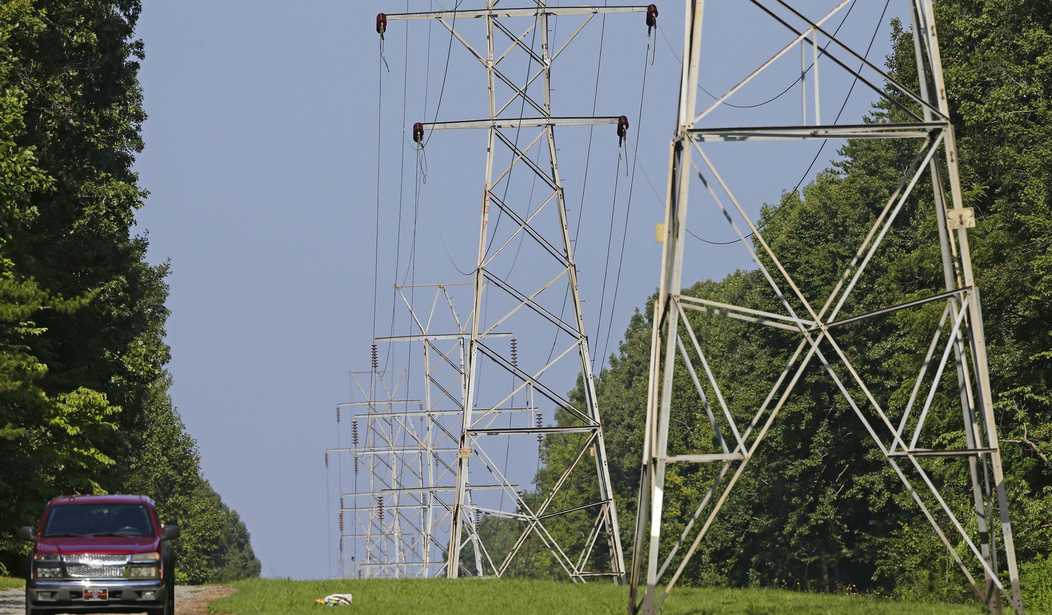Last Friday, several terrorists (or mischief-makers) sliced some fiber optic signaling cables causing a disruption that stranded 100,000 passengers.
Authorities have no idea who's responsible, although they've arrested a far-left activist and are holding him for questioning. And then, "the cables of several telecoms operators were sabotaged in six areas of France overnight from Sunday into Monday," reports AFP.
"It's vandalism," said Nicolas Chatin, spokesman for SFR, one of France's four biggest broadband operators. "Large sections of cables were cut. You would have to use an axe or a grinder."
Only about 10,000 line customers were affected by the broadband outages. But even if it isn't anything more than left-wing clowns making mischief, the attacks on infrastructure highlight the extreme vulnerability of the modern world's communications. The signaling outage meant that operators had no idea where the trains were on the tracks. It was too dangerous to keep the trains running.
What more could have been done to secure rail lines and broadband communications? France deployed 20,000 troops around Paris along with 40,000 police officers. The security at the Olympic Village where the athletes are living is so tight that a Brazilian female swimmer was sent home when she left the athlete's village without permission to go on a date with her boyfriend.
But that's Paris. When it comes to the rest of the country, it's hit or miss.
“They’ve put a very effective ring around Paris and you look for the very soft underbelly, and that’s everything outside Paris,” said Dale Buckner, Chief Executive Officer of security firm Global Guardian.
France has about 22,000 miles (35,000 kilometers) of railway tracks and a vast network of internet cables. “It’s impossible to monitor all 35,000 kilometers,” Jean-Pierre Farandou told reporters on Saturday at Gare Montparnasse, the station most affected by Friday’s attack.
That's a timely rethink given the attacks on the rail and, particularly, the fiber-optic networks in France—especially given that just days before the Olympics opened, authorities arrested Paris-based Russian chef/FSB spy Kirill Gryaznov for plotting to disrupt the opening ceremonies on behalf of his handlers in Moscow. That he was caught because he got drunk and publicly boasted of his mission would be laughable if much of the world hadn't just been brought to its knees because a computer security company didn't properly test its latest software update.
Adding weight to the arrest is that Russia and the West are engaged in a not-so-quiet sabotage war.
"In April alone a clutch of alleged pro-Russian saboteurs were detained across the continent," The Economist noted on May 12. "Germany arrested two German-Russian dual nationals on suspicion of plotting attacks on American military facilities and other targets on behalf of the GRU, Russia's military intelligence agency. Poland arrested a man who was preparing to pass the GRU information on Rzeszow airport, the most important hub for military aid to Ukraine. Britain charged several men over an earlier arson attack in March on a Ukrainian-owned logistics firm in London whose Spanish depot was also targeted."
The U.S. is particularly vulnerable. In 2019, The Wall Street Journal's Rebecca Smith emphasized that "despite federal orders to secure the power grid, tens of thousands of substations are still vulnerable to saboteurs."
Congress authorized $3.5 billion to harden the electric grid last year, but that money only went to 55 projects. We're way behind, and with Russia growing bolder in attacking our infrastructure, time is running out.
“If you know where these strategic cables are, accessing and cutting them is not very complicated with the right tools,” said Arthur Laudrain, Postdoctoral Research Associate in Cyber Diplomacy at King’s College London. “It is difficult to secure these cables effectively, given the number of physical access points used for maintenance.”
Nothing concrete will be done until we're hit with an infrastructure attack that causes massive disruptions. Until then, we'll just skate along and pray we can head off any attack before it hits us.










